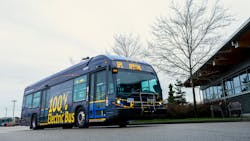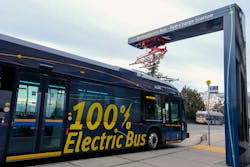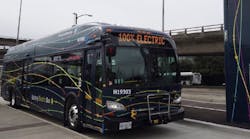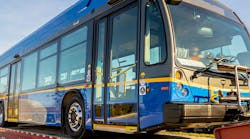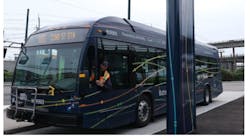TransLink puts first LFSe+ bus into service
Metro Vancouver, British Columbia, transit users will see a new model of electric bus out and about on TransLink’s network with the introduction of the first Nova Bus LFSe+ electric bus into service. The bus, which arrived in November 2022, is the first of 15 TransLink order in January 2021 that will quadruple the agency’s zero-emission fleet from four to 19. The vehicles will fully electrify Route 100.
“Electrifying our bus fleet and moving to renewable fuels are the fastest ways TransLink can reduce GHG emissions to help combat climate change. Taking transit is already one of the best ways people can reduce their carbon footprint, but through electrification and the actions outlined in our Climate Action Strategy, we’re working to reduce our impact on the climate to zero,” said TransLink CEO Kevin Quinn.
TransLink explains the expansion of the electric bus fleet is a critical step towards achieving climate targets outlined in the agency’s Climate Action Strategy and Transport 2050: 10-Year Priorities. TransLink’s long-term goal is to introduce 400 new battery-electric buses to its fleet by 2030 and to fully transition the fleet to zero-emission vehicles by 2040. By 2050, the agency aims to achieve net-zero greenhouse gas emissions in all operations.
“Battery-electric buses are an important part of the future of public transportation. TransLink’s battery-electric bus fleet will provide more sustainable transit options and will help reach our government’s emissions reductions targets set out in the CleanBC Roadmap to 2030,” said Minister of Transportation and Infrastructure and Minister responsible for TransLink, Government of British Columbia, Rob Fleming
The C$16-million (US$12.04-million) contract for the 15 buses was funded through the Canada Community–Building Fund (CCBF), which is administered in British Columbia by the Union of B.C. Municipalities. The governments of Canada and British Columbia have also committed support toward the future electrification of TransLink’s fleet through significant investments in TransLink’s 2022 Investment Plan.
“The Canada Community-Building Fund has been helping communities address their infrastructure priorities for nearly 20 years. The expansion of TransLink’s battery-electric bus fleet is an example of the positive benefits these investments provide. Our government is proud to support projects that contribute to our emissions goals and will continue to deliver CCBF funds across B.C. to help build cleaner and more sustainable communities,” said Parm Bains, Member of Parliament for Steveston – Richmond East, on behalf of the Honorable Dominic LeBlanc, Minister of Intergovernmental Affairs, Infrastructure and Communities.
Over the coming months, TransLink will order more battery-electric buses, as well as the necessary charging infrastructure to support them on more routes.
World debut of LFSe+
In addition to the LFSe+ debuting on Vancouver streets, TransLink is the first system in the world to see the Nova Bus model in service. The LFSe+ was first introduced at the American Public Transportation Association’s (APTA) TRANSform Conference in New York City in October 2019. Two years later, Nova Bus introduced the long-range dual charging LFSe+.
The long-range LFSe+ model completed Altoona testing in September 2022. The bus can travel 150 kilometers (93.2 miles) on a single charge and can be topped up by on-route overhead chargers in approximately five minutes.

Mischa Wanek-Libman | Group Editorial Director
Mischa Wanek-Libman is director of communications with Transdev North America. She has more than 20 years of experience working in the transportation industry covering construction projects, engineering challenges, transit and rail operations and best practices.
Wanek-Libman has held top editorial positions at freight rail and public transportation business-to-business publications including as editor-in-chief and editorial director of Mass Transit from 2018-2024. She has been recognized for editorial excellence through her individual work, as well as for collaborative content.
She is an active member of the American Public Transportation Association's Marketing and Communications Committee and served 14 years as a Board Observer on the National Railroad Construction and Maintenance Association (NRC) Board of Directors.
She is a graduate of Drake University in Des Moines, Iowa, where she earned a Bachelor of Arts degree in Journalism and Mass Communication.
